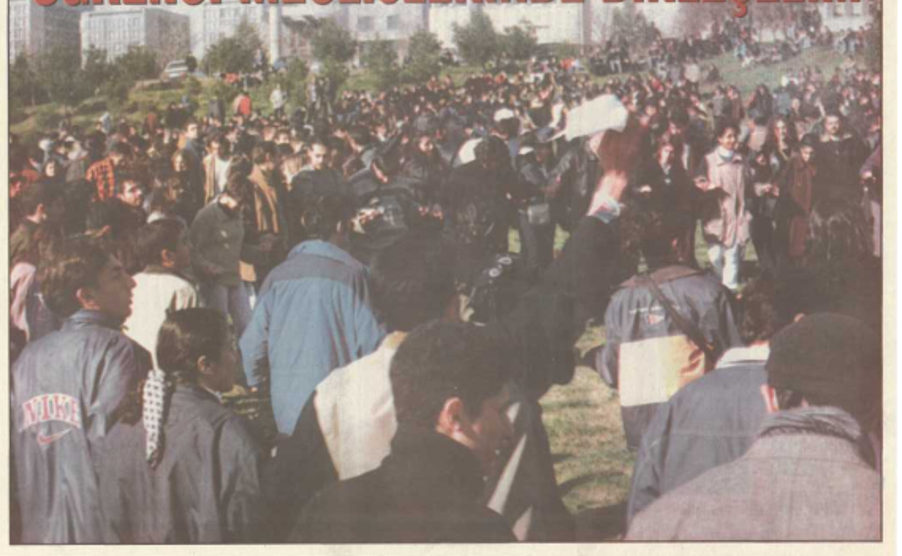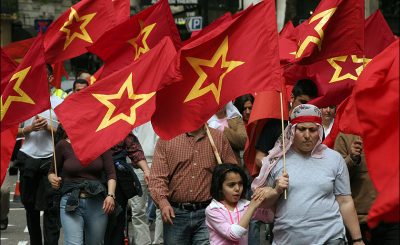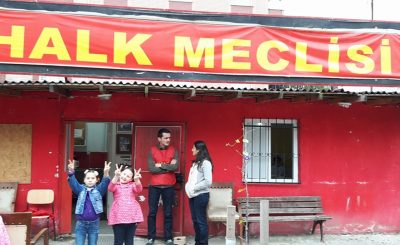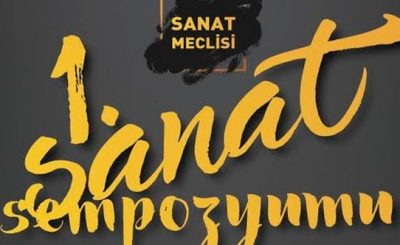Since September 30, 1997 the third wave of the “minute of silence” action has been going on. But although every evening thousands of people go out onto the streets, the bourgeois radio and TV do not report the action, nor do the newspapers owned by the major conglomerates.
Why? Because the actors in these events are the people themselves. Because the people’s councils are what the camera lens would have to show. Because from the mouth of the people there would not merely be calls for a few mafia and contra-guerrilla figures like “Agar and Bucak” [two members of the Turkish parliament, the first a former government minister; both involved in the Susurluk scandal] but demands for justice in relation to the whole mafia and contra-guerrilla state. The slogans echoing in the street are not “Ban the Welfare Party” or “Let’s have new elections”, but “Let us call the Susurluk state to account”. Because the people shouting the slogans march behind the symbol of people’s power, the banner of the people’s councils. The media cannot carry reports about the “minute of darkness”, because at the head of the action are the revolutionaries, because we are taking part.
On October 5, 1996, shortly before the Susurluk accident which happened on November 3, 1996, the first people’s council was founded, the Gazi People’s Council in Istanbul/Gazi. Its foundation was the first success of the Party-Front’s continual, concrete and broad-based work to achieve the unity and organisation of the people. A year has passed since Susurluk. After the people’s council in Gazi was founded, two others were set up in Okmeydani/Istanbul and the villages around Bergama. In Nurtepe, Esenler, Gulsuyu, Bagcilar, Birlik (Unity) District, Caglayan, Alibeykoy, Kartal and Armutlu, people’s councils are in the preparatory stage. In Ankara, Mersin, Bursa, Izmir, Malatya, Antakya, Antalya and Eskisehir the people march every evening behind the slogan “The people’s councils are our strength”. This is the power which is demanding a reckoning from the Susurluk state.
The people’s councils are the power of the people, the basis of people’s power. This power is the fear, the nightmare of the state. “We want justice.” This is the chief demand of the people today. And this fact is known to all and obvious to everybody: the state will never bring the armed gangs to justice, people’s justice will do it. This demand, this power, is legitimate in the highest degree. This legitimacy can be neither denied nor extinguished by anyone. Despite all repression, despite arbitrary arrests, despite police truncheons, the people come out onto the streets every evening in their thousands. And this mass of people, this strength, grows and unites…
The development of this strength is not the result of chance, but of long and patient work. The need for people’s unity and organisation has been sensed by many. But this need could not be satisfied with abstract slogans and discussion circles. Organising the people means first of all knowing them and living among them. It means knowing the people’s demands and offering concrete solutions to their concrete problems. It means showing the people a solution, a path, the path to revolution. To organise the people along this path means marching together with them and leading them. To be able to do this, one must have the trust of the people, one must be the repository of the people’s hopes.
The decades of struggle of the Party-Front, from the THKP-C [founded by Mahir Cayan in the early 1970s] to Devrimci Sol and from Devrimci Sol to the DHKP-C cannot be separated from the people’s struggle. We became the people’s hope because we fought for the people and among the people, defended the people’s demands and gave hundreds of martyrs. This is the basis of the line we followed in proposing the people’s councils and taking the initiative of organising the people.
Yes, the people’s councils are not organisations of the Party-Front, they are organisations of the people themselves. There is no organisational connection between the Party-Front and the people’s councils. But the development of the people’s councils entails at the same time enlarging the Party-Front. As people’s organisations, the people’s councils are also capable of taking reactionary decisions. However, one must work with the masses in the people’s councils and increase their consciousness. It is necessary to hold discussions with the people and convince them and give them confidence. Our aim is the revolution, people’s power. We will win this with the people’s war, we will win by organising the people for the war. The people demand “justice”. This justice is people’s justice and not that of the system. Satisfying this demand is a matter for the people’s councils, the people’s constitution and people’s power.
This is what should be on the agenda from the perspective of the people’s movement and the revolution today. Besides that, there is nothing to be said, no propaganda which can tell the masses anything new. It is clear that neither the “anti-Refah Party” slogans, nor the demands for “fresh elections”, nor the discussions about “peace” can offer a solution. The continuing executions, massacres and murders give rise to growing anger in the hearts of the people. The “1,000 secret contra-guerrilla operations” are the expression of politics which threaten the people. The isolation cells prepared in the jails for the children of the people are an open expression of a politics and power which is opposed to us. Under these conditions, revolutionary politics and strategy can be nothing other than organising the people even further, uniting the organisations of the revolutionaries and the people even more and unmasking as vain dreams any hopes the people have for solutions within the system.
It is the task of the Front’s leadership, whether through the “one minute of darkness” action or through revolutionary work, to strengthen the demands of the masses in the people’s councils for a reckoning to be demanded for the 1,000 contra-guerrilla operations, for activity on behalf of the prisoners, protests against inflation, repression and mass arrests.
By carrying out this task the people’s movement and struggle will grow under the leadership of the Front. At present there is no task other than to accelerate this development. All forms of struggle, all forms of organisation must be placed at the service of this task.
Source: Revolutionary Left(Devrimci Sol) magazine, February 1998




